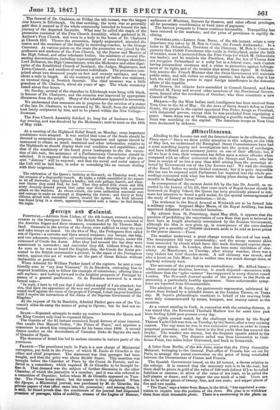iforrign anti colonial.
Poirruosr..—Advices from Lisbon, of the 4th instant, recount a serious reverse to the insurgent forces. The British fleet off Oporto consisted of the America frigate and three steamers, commanded by Sir Thomas Mait- land. Steamers in the service of the Junta were suffered to enter the port and take troops on board. On the 31st of May, the Portuguese fleet sailed out of Oporto—a corvette and three armed steamers; one barque, one brig, and two schooners, transports; all containing about 4,000 troops, under the command of Conde das Antes. After they had crossed the bar they were summoned to surrender; and surrender they did, without firing a shot. As soon as he was on board the English ship, the Conde das Antes pre- sented to the British commander a protest, in the name of the Portuguese nation, against this act of warfare on the part of Great Britain without declaration or pretext.
When Admiral Sir William Parker heard of the capture, he sent a very friendly note to " my dear Viscount," Sic da Bandeira, entreating him to suspend hostilities, and to follow the example of submission; offering him a safe asylum; and looking forward to the brighter prospects of Portugal by means of a general pacification. Sit dc. Bandeira answered in a more formal note— "In reply, I have to tell you that I shall defend myself if I am attacked; but also, that upon the appearance of the new and powerful enemy which has pre- sented itself against the cause of the people of Portugal, I shall suspend hostilities until I receive the instructions of the Junta of the Supreme Government of the Kingdom."
At the request of SA da Bandeira, Admiral Parker gave one of the Vis- count's aides-de-camp the means of going to Oporto; but he bad not re- turned.
SPAIN.—Repeated attempts to make up matters between the Queen and the King Consort only lead to repeated failure.
The Gazette of the 2d instant contained Royal decrees of some interest. One recalls Don Manuel Godoy, " the Prince of Peace," and appoints a committee to award him compensation for his losses since 1808. A second decree confers on the descendants of Castafios Duke de Baylen the rank of Grandee of Spain.
The dearness of bread has led to serious imeutes in various parts of the provinces.
FRANCE.—The prominent topic in Paris is a new charge of Ministerial corruption, put forth in the Prase; of which M. Emile de Girardin is the editor and chief proprietor. The statement was that peerages had been bought, and that the price was about 80,000 francs. This assertion was brought before the Chamber of Peers by the Count de Pontois, and re- firmed to a committee; which required M. de Girardin to be brought be- fore it. That demand was the subject of further discussion in the other Chamber, of which the journalist is a member; and it was also referred to a committee of Deputies; before whom M. de Girardin appeared on Tues- day. The Presse keeps silent; but the matter is thus explained. When the Epoque, a Ministerial journal, was purchased by M. de Girardin, the private papers of that office came into his possession; and among them, it is said, he found proofs that the conductors of the journal had dispensed promises of peerages, titles of nobility, crosses of the Legion of Honour,
audiences of Ministers, licences for theatres, and other official privileges, all for pecuniary consideration at fixed rates of payment. The harvest prospects in France continue favourable. Tranquillity has been restored to the markets; and the price of provisions is rapidly de- clining.
SwirzEktax0.—Letters from Berne, of the 4th instant, relate a very important step taken by M. Bois le Comte, the French Ambassador. In a letter to M. Ochsenbein, President of the Directory, M. Bois le Comte re- presents that 15,000 Frenchmen who reside in Switzerland, under the faith of treaties, must be protected from the Free Corps (of which M. Ochsenbein was leader); and he reminds the President, that the Act of Vienna does not recognize Switzerland as a unity but as a federal state, each Canton having independent existence and a claim to protection against infringe- ment of its rights and of the treaties that attest those rights. M. Ochsen- bein assures the French Minister that the Swiss Government will maintain public order, and will violate no existing treaties; but ho adds, that it has both the will and the power to repel foreign interference in the domestic) affairs of the republic.
At Geneva, the citizens have assembled in Council-General, and have reelected M. Fazey and several other members of the Provisional Govern- ment, formed after the revolution of October; who thus constitute a new Council of State.
MExico.—By the West Indian mail, intelligence has been received from Vera Cruz to the 3d of May. On the news of Santa Anna's defeat at Cerro Gordo, the people in the capital appointed Don Pedro Anaga as President, with dictatorial powers, except that ho was precluded from negotiating a peace. Santa Anna was at Oriata, organizing a guerilla warfare. General Scott was marching on the capital. The American troops at Vera Cruz were decimated by sickness.


























 Previous page
Previous page